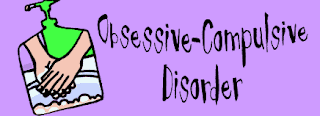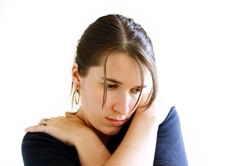
Generalized Anxiety Disorder (GAD):
Symptoms of GAD include:
- Unable to relax
- Startle easily
- Difficulty concentrating
- Trouble falling asleep or staying asleep
- Fatigue
- Headaches
- Muscle tension
- Muscle aches
- Difficulty swallowing
- Trembling
- Twitching
- Irritability
- Sweating
- Nausea
- Lightheadedness
- Having to go to the bathroom frequently
- Feeling out of breath
- Hot flashes
Treatment:
If you think you have an anxiety disorder such as GAD, the first person you should see is your family doctor. A physician can determine whether the symptoms that alarm you are due to an anxiety disorder, another medical condition, or both.
Early treatment can help keep the disease from progressing to its later stages, and people can learn effective ways to live with this disorder. Treatment options include:
- Medications
- Cognitive therapy (to change or get rid of destructive thought patterns)
- Behavioral therapy (to change a person's behavior)
- A combination of these treatments
Obsessive Compulsive Disorder (OCD):

People with obsessive compulsive disorder (OCD) have thoughts (obsessions) or rituals (compulsions) which happen over and over again. Rituals — such as hand washing, counting, checking on a specific item (like whether the oven was left on), or cleaning — often are done in hope of stopping the thoughts. Doing these rituals, though, gives only short-term relief. Ignoring the urge to do the ritual greatly increases anxiety. Left untreated, obsessions and the need to perform rituals can take over a person's life. OCD is often a chronic, relapsing illness.
People with OCD sometimes have other mental health disorders, such as depression, eating disorders, substance abuse, attention deficit hyperactivity disorder, or other anxiety disorders. When a person also has other disorders, OCD is often harder to diagnose and treat. A person can have symptoms of OCD at the same time as, or that are part of, other brain disorders, such as Tourette's syndrome. Getting the right diagnosis and treatment of other disorders is important to successful treatment of OCD.
Treatment:
If you think you have obsessive compulsive disorder, the first person you should see is your family doctor. A physician can determine whether the symptoms that alarm you are due to an anxiety disorder, another medical condition, or both.
Research shows that people with OCD have patterns of brain activity that differ from people with other mental illnesses or people with no mental illness at all. There is also proof that both behavioral therapy and medication can help people with OCD. A type of behavioral therapy known as "exposure and response prevention" is very useful for treating OCD. In this approach, a person is exposed to whatever triggers the obsessive thoughts, and then is taught ways to avoid doing the compulsive rituals and how to deal with the anxiety.
Panic Disorder:
Panic disorder is a type of anxiety disorder. Other types of anxiety disorders include generalized anxiety disorder, obsessive compulsive disorder, social phobia, and post-traumatic stress disorders. Panic disorder affects women twice as often as men.
Panic attacks are the most common symptom of this disorder. A person is having a panic attack when they feel:
- A sense of terror that strikes suddenly and repeatedly with no warning
- Chest pain
- Difficulty breathing
- Flushes or chills
- Fear of losing control
- Fear of dying
Because these attacks are so unpredictable, many women may have intense anxiety between panic attacks. While most attacks last a few minutes on average, sometimes they can last as long as 10 minutes. In rare cases, they may last an hour or more.
Treatment:
If you think you have an anxiety disorder such as panic disorder, the first person you should see is your family doctor. A physician can determine whether the symptoms that alarm you are due to an anxiety disorder, another medical condition, or both.
Early treatment can help keep the disease from getting worse, and people can learn effective ways to live with this disorder. Treatment options include:
- Medications
- Cognitive therapy (to change or get rid of destructive thought patterns)
- Behavioral therapy (to change a person's behavior)
- A combination of these treatments
Social phobia (or social anxiety disorder):

Social phobia, also called social anxiety disorder, is diagnosed when people become overwhelmingly anxious and very self-conscious in everyday social situations. People with social phobia have a strong fear of being watched and judged by others and of doing things that will embarrass them. They can worry for days or weeks before a dreaded situation. This fear may become so severe that it interferes with work, school, and other ordinary activities, and can make it hard to make and keep friends.
Physical symptoms that often accompany social phobia include:
- Blushing
- Sweating
- Trembling
- Nausea
- Difficulty talking
Social phobia affects about 15 million American adults and affects women and men in equal numbers. People with social phobia often have other anxiety disorders and/or depression as well. Substance abuse can develop if a person with social phobia uses alcohol or drugs to soothe their anxiety.
Treatment:
If you think you have an anxiety disorder such as social phobia, the first person you should see is your family doctor. A physician can determine whether the symptoms that alarm you are due to an anxiety disorder, another medical condition, or both.
Treatment options include:
- Medications
- Cognitive therapy (to change or get rid of destructive thought patterns)
- Behavioral therapy (to change a person's behavior)
- A combination of these treatments
Specific phobias:
A specific phobia is a strong, irrational fear of something that poses little or no actual danger. Some of the more common specific phobias are:
- Closed-in places
- Heights
- Escalators
- Tunnels
- Highway driving
- Water
- Flying
- Dogs
- Injuries involving blood
Such phobias aren't just extreme fear; they are irrational fear of a particular thing. You may be able to ski the world's tallest mountains with ease but be unable to go above the fifth floor of an office building. While adults with phobias realize that these fears are irrational, they often find that facing, or even thinking about facing, the feared object or situation brings on a panic attack or severe anxiety.
Specific phobias affect an estimated 19.2 million adult Americans and are twice as common in women as men. They usually appear in childhood or adolescence and tend to persist into adulthood. The causes of specific phobias are not well understood, but there is some evidence that the tendency to develop them may run in families.
If the feared situation or feared object is easy to avoid, people with specific phobias may not seek help. Treatment is needed if the phobia hurts a person's career or personal life.
Treatment:
If you think you have an anxiety disorder such as specific phobia, the first person you should see is your family doctor. A physician can determine whether the symptoms that alarm you are due to an anxiety disorder, another medical condition, or both.
Specific phobias respond very well to carefully targeted psychotherapy.

0 comments:
Post a Comment